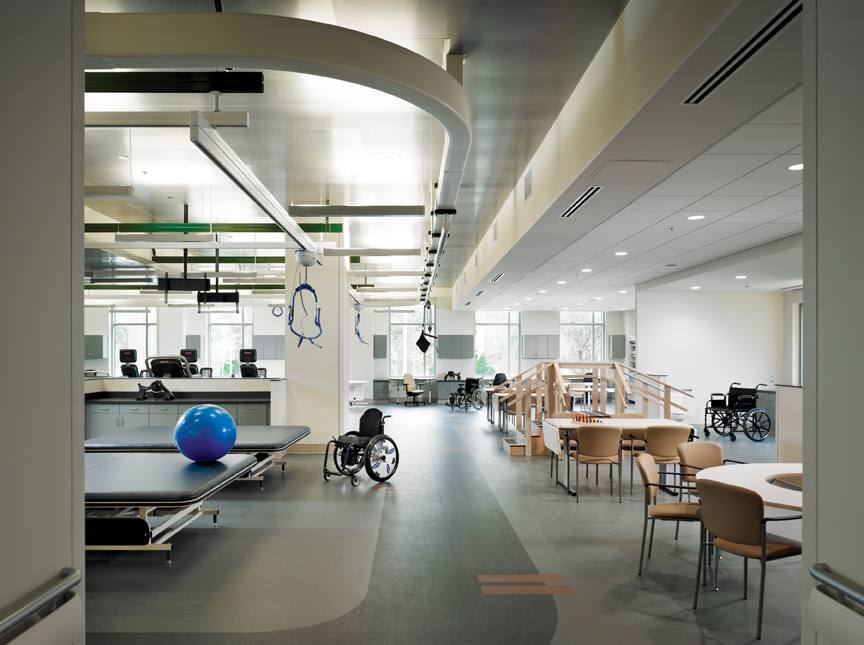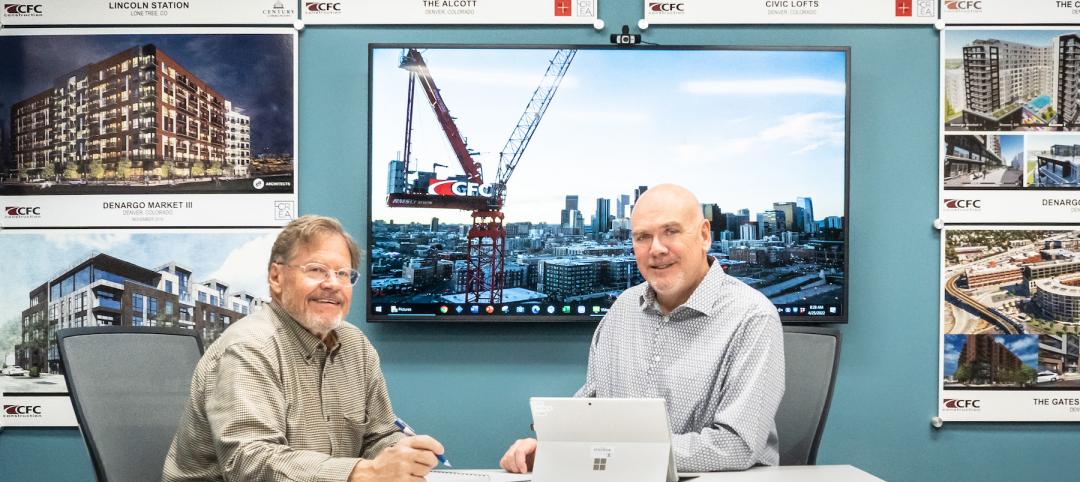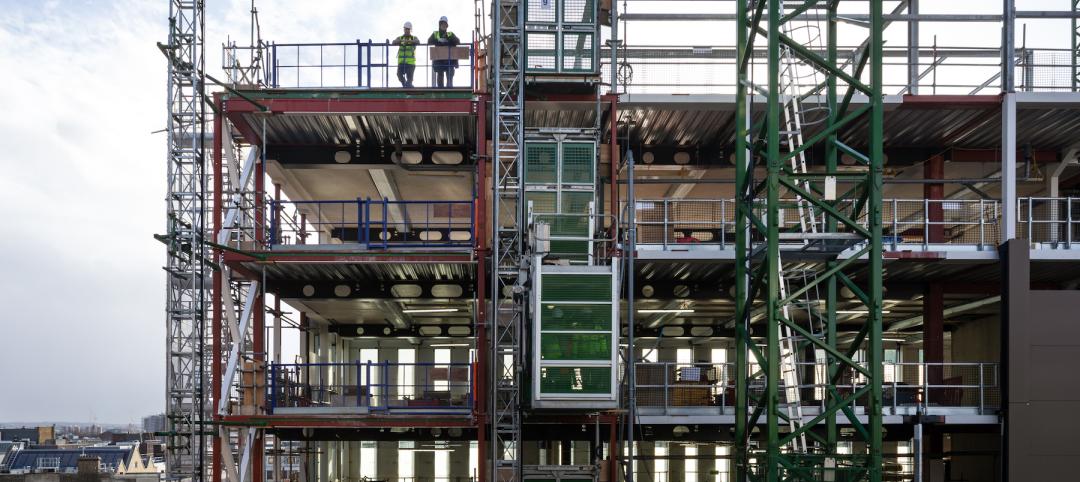2012 Building Team Awards
Gold Award
Since the early 2000s, the U.S. Department of Veterans Affairs has treated more than 200,000 Iraq- and Afghanistan-war veterans for post-traumatic stress disorder. The rate of traumatic brain injury (TBI) among U.S. forces has risen dramatically in the last decade as well, from 10,963 cases in all of 2000 to 30,380 just in the fourth quarter of 2011.
Audie L. Murphy VA Hospital in San Antonio, Texas, named after the most decorated soldier of World War II, provides a place for this dramatically increasing number of wounded veterans to receive care. The Building Team—prime contractor Robins & Morton and joint venture design firms SmithGroupJJR and Marmon Mok—faced complicated site logistics and security restrictions, but still managed to come in under budget and produce a facility that meets the physical and psychological needs of the veterans it serves.
This hospital was the VA’s first project constructed under the so-called “Integrated Design and Construct” method, which teams the contractor with the architect and owner early in the construction process. The Building Team credits this collaboration with the facility’s month-early completion and $3.75 million cost savings. Although the project was not required to be LEED-certified, the team still implemented high-level sustainability.
At the project’s core were the hospital’s patients: veterans recuperating from multiple traumatic injuries, often including limb loss and TBI. The “Planetree” principle—which seeks to create a healing environment inspired by nature—was employed throughout the facility’s design.
Because many TBI patients are extremely sensitive to light and noise, the Building Team used indirect and accent lighting and equipped each bed with controls so every patient can individually adjust the levels. All windows diffuse natural light and are equipped with blackout shades. Working with acoustic noise consultants, the team used low-pressure diffusers and air ducts to minimize the sound of air rushing through the HVAC system.
The Building Team went beyond standard ADA requirements and handicap-accessibility considerations to incorporate tools that help patients rehabilitate. The facility’s physical therapy gymnasium is used to work on remobilization in everyday scenarios, such as getting around the kitchen and bathroom and walking up and down stairs. Tracks for patient lift systems run along the ceilings throughout the facility to allow patients to walk while tethered, improving their balance, strength, and autonomy.
The GAIT Study room features a high-tech flooring system that measures the pressure points and angles with which a patient walks, runs, and jumps to assess whether correction is needed. The VA was also able to use a portion of the project’s $3.75 million cost savings to install a terrain park in the building’s center courtyard that functions as a physical therapy tool, with pull-up bars, steps, and paths of different surfaces.
“It’s one thing to say that you saved money, but to get a clear amenity out of it is a sign of a great Building Team,” said Tim Brown, AIA, of Tim Brown Architecture and associate professor at IIT’s College of Architecture, Chicago.
Hurdles posed by site logistics were handled quickly and efficiently. The laydown area and construction-employee parking lot were a full mile from the job site, requiring bussing workers to and from every day and night. Only one delivery truck could be on site at a time and every piece of material had to be scheduled in advance.
Project summary
GOLD AWARD
Audie L. Murphy VA Polytrauma Rehabilitation Center
San Antonio, TexasBuilding Team
Submitting entity: Robins & Morton (prime contractor)
Owner/developer: U.S. Department of Veterans Affairs
Architect: SmithGroupJJR | Marmon Mok Joint VentureGeneral Information
Project size: 84,000 sf
Construction cost: $39.5 million
Construction time: August 2009 to July 2011
Delivery method: Integrated design and construct
Phase one of the project included some work underneath the hospital’s existing parking lot, which meant that, for six weeks, Robins & Morton had to schedule work during nights and weekends to eliminate disruption to the hospital campus. Moreover, when the team tried to tie in the existing hospital to the new facility, it discovered that the 40-year-old building’s precast was falling down. The contractor had to remediate this problem while making sure that the new structure didn’t look like an add-on.
The Building Team’s commitment to veterans was paramount throughout the project. When, arguably for security reasons, the VA wanted to put up an Internet firewall, the team, knowing how important access to social media via laptops and mobile devices is to the new generation of veterans, fought for and got access to the Web for patients.
Robins & Morton also exceeded its goals for construction subcontracts granted to small veteran-owned businesses, awarding 17% to them. It also granted 10% to service-disabled veteran-owned small businesses, 6% to small disadvantaged businesses, 5% to women-owned small businesses, 41% to small business enterprises and 21% to HubZone small business.
Building Team Awards judge Terry Fielden, LEED AP BD+C, director of K-12 Education at International Contractors Inc., said he was impressed with the way the design came to fruition: “There was a lot of collaboration, especially with the veterans’ needs in mind.” BD+C
--
Click here to view exclusive video interviews of the 2012 Building Team Awards judges explaining their selection.
Related Stories
Legislation | May 4, 2022
Washington is first state to mandate all-electric heat for new large buildings
Washington recently became the first state to require all electric heat for new buildings.
Building Team | May 4, 2022
Mancini Acquires Gertler & Wente Architects, Expanding the Firm's Opportunities in New Market Sectors
National design firm Mancini Duffy - with a 100+-year-old history and tech-forward approach based in New York City - announces the acquisition of Gertler & Wente Architects to further expand its footprint in the healthcare, multi-family residential, restoration, institutional, and religious sectors.
Contractors | May 4, 2022
CFC Construction names Pat Smith president
CFC Construction is proud to announce that Pat Smith has been promoted to President of the Colorado-based general contractor.
Sponsored | Healthcare Facilities | May 3, 2022
Planning for hospital campus access that works for people
This course defines the elements of hospital campus access that are essential to promoting the efficient, stress-free movement of patients, staff, family, and visitors. Campus access elements include signage and wayfinding, parking facilities, transportation demand management, shuttle buses, curb access, valet parking management, roadways, and pedestrian walkways.
Sponsored | BD+C University Course | May 3, 2022
For glass openings, how big is too big?
Advances in glazing materials and glass building systems offer a seemingly unlimited horizon for not only glass performance, but also for the size and extent of these light, transparent forms. Both for enclosures and for indoor environments, novel products and assemblies allow for more glass and less opaque structure—often in places that previously limited their use.
Architects | May 3, 2022
A U.K.-based design firm flaunts industrialized construction as it expands into U.S.
Bryden Wood wants to set up a network for manufactured components for repeatable building types.
Codes and Standards | May 3, 2022
American Institute of Steel Construction updates environmental product declarations
The American Institute of Steel Construction has released updated environmental product declarations (EPDs) “to help designers and building owners design more environmentally friendly buildings and bridges,” according to an AISC news release.
Education Facilities | May 2, 2022
Texas School for the Deaf campus gateway enhances sense of belonging for deaf community
The recently completed Texas School for the Deaf Administration and Welcome Center and Early Learning Center, at the state’s oldest continuously operating public school, was designed to foster a sense of belonging for the deaf community.
Codes and Standards | May 2, 2022
Developer Hines, engineer MKA develop free embodied carbon reduction guide
Real estate management and investment firm Hines has released the Hines Embodied Carbon Reduction Guide. The free guide, produced with Magnusson Klemencic Associates (MKA), is the result of a two-year effort, relying on MKA’s industry-leading knowledge of carbon accounting and involvement in programs such as the Embodied Carbon in Construction Calculator (EC3) Tool.
Building Team | May 2, 2022
HED and VAI announce merger to bring strategic expertise and drive community impact in Dallas
HED (Harley Ellis Devereaux), a leading national architecture and engineering firm, today announced a merger with award-winning, Dallas-based VAI Architects Incorporated (VAI).

















